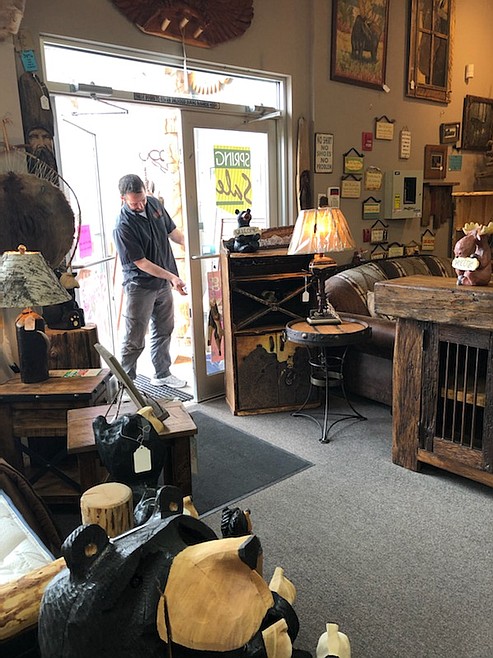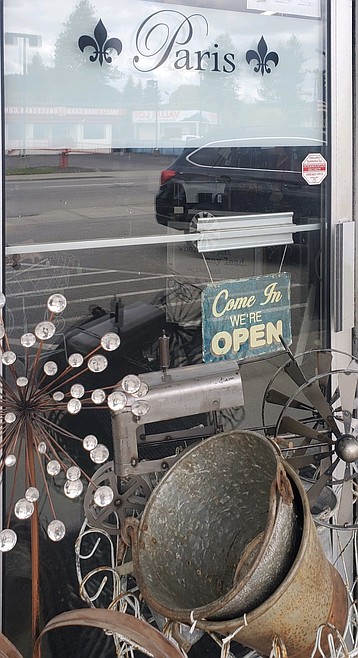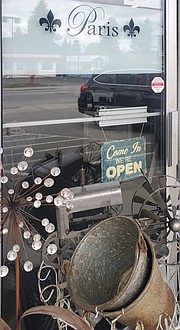Lockdown over: Businesses opening to new normal
Today is the first step in what political leaders, health care professionals and economists believe will be a long road to recovery from the coronavirus.
Gov. Brad Little’s stay-home order — a March 25 decree that essentially shut down churches, retail spaces and restaurant tables throughout Idaho — expired Thursday, replaced by a four-stage recovery now underway. The plan, dubbed Rebound Idaho, begins with the opening of church doors, day care centers and — for thousands of eager shoppers — most retail businesses.
“I’m pleased to announce, due to the continued responsible actions of the people of Idaho to slow the spread of the coronavirus, we’ve met criteria to enter into stage one of our safe, responsible approach to re-opening Idaho’s economy,” Little proclaimed Thursday at a Boise press conference.
Open For Business
With most — but not all — businesses now eligible to open to the public, retailers are expecting a heavy resurgence of cash flow in North Idaho.
“We’re expecting heavy foot traffic,” said Jeffrey Gagnon of Paris Flea Market on Fourth Street in Coeur d’Alene. “We think there are going to be a lot of people who want to get out and support local businesses.”
Paris Flea Market is one of more than 300,000 small businesses in Idaho. Little’s new rebound order authorizes about 90 percent of all businesses in the state to re-open their retail space today as part of his plan to gradually re-introduce the population into the economy.
Not all businesses will open their doors, however: Nail and beauty salons, gyms, bars, nightclubs and indoor movie theaters will remain closed. Those hoping to enjoy a lunch break on their shopping sprees will have to enjoy them in their cars, as restaurants are — for another few weeks — still open only to curbside and takeout.
Still, the re-opening is something locals are looking forward to.
“Oh, man, I’m excited,” said A.J. Hartman, shop foreman at Wild West Rustic Furniture on Clayton Avenue, a popular furniture retailer along U.S. 95 in Coeur d’Alene that’s spent the pandemic open for curbside and by-appointment customers. “We’re ecstatic to open up and get things back to normal a little.”
With COVID-19 likely living on the world’s stage for the foreseeable future, businesses are still urged to follow Little’s guidelines to fight the virus, guidelines borrowed from the Centers for Disease Control.
These stipulations require the same protocols the public has been following since the outbreak began: washing hands, disinfecting surfaces and practicing social distancing, to name a few.
“Give everybody a little space,” Wild West Rustic owner Carol Folda said. “We’ll wipe down the phones, the credit card machines, bathrooms, things like that. It’s really important to us that we make our customers feel safe when they shop with us.”
Folda said the pandemic created an unusual pocket of economic prosperity that has kept Wild West Rustic afloat during one of the most severe economic downturns in memory.
“We have all these people who came up from California and bought land here,” she said. “They built these houses, and then the virus hit, and they’ve been stuck in their homes with no furniture.”
Folda said that stroke of luck should be a sign of good news for businesses.
“I want other businesses to be encouraged by that,” she said. “I want people to know that we’ve seen a huge amount of sales, all things considered. There’s light at the end of this. We can all get through this.”
Katherine Hoyer of Panhandle Health District said it’s critical that people don’t confuse open with over.
“We know it is difficult to be apart from those we care about,” Hoyer said, “but we encourage everyone to maintain the same level of social responsibility to each other as we move forward.”
Little’s new order says that businesses authorized by each of the four stages will be able to open so long as companies follow strict hygiene protocols and enforce social distancing. The governor urged Idahoans who venture out to do the same, encouraging the use of masks.
If officials are satisfied after two weeks that infection rates haven’t increased, the state would move to stage 2. The state would advance in two-week increments to stages 3 and 4 with increasing lifting of restrictions if infections don’t increase.
Stage 2, for example, allows gatherings of up to 10 people. Stage 3 raises that to 50, and in stage 4, gatherings of more than 50 people are allowed. But even in stage 4, precautions are included that limit occupancy in bars and require social distancing in theaters and other large venues.
COVID Hours
Many essential businesses that remained open through the stay-home order, such as banks and drive-thru coffee stands, have adjusted their hours for reasons ranging from payroll to public safety. Some businesses will retain those curtailed hours for the time being. Some won’t open today.
“Right now, we’re only going to stay open by appointment only,” said Erika Bates, manager of Affordable Elegance Bridal on Government Way. “We’re going to ease back into it as best we can.”
Bates said Affordable Elegance is maintaining appointment-only status because the very nature of one of her biggest revenue generators — weddings — is months away from recovery.
“We’ve had so many people who’ve had to postpone,” she said. “Public venues have been shut down. Locations have been [made unavailable]. The only people who’ve been able to keep their dates are having weddings on family property or places like that.”
Bates stressed that the industry as a whole has been suffering since the pandemic first struck, from photographers to bakers to florists, adding that easing restrictions doesn’t magically change consumers’ circumstances.
“These people who just want to have a nice wedding, they’ve been out of work — some of them for months,” she said. “It’s not realistic for them to say, ‘Now, let’s go out and throw a big wedding.’ They have bills to pay, too.”
A Helping Hand
Bates said her bridal shop is fortunate in the sense that many of her competitors closed entirely ever since the stay-home order.
“We’ve been lucky,” she said. “We’ve had a lot of people come to us because a lot of bridal shops couldn’t help them. And we’ve helped them, but it’s been all on our own: We didn’t get a grant. We didn’t get a loan. We didn’t get stimulus. We didn’t get anything.”
Gagnon of Paris Flea Market said he’s lost $16,000 in estimated revenue. When asked how long it would take for him to recover those losses, he shook his head.
“That depends on the government,” he said. “If they open up their Small Business Administration disaster recovery programs, it’ll be pretty quick. If they don’t, it’ll take years.”
The SBA and the federal government have come under fire since Congress approved a $2.2 trillion stimulus package that includes forgivable loans to small businesses. Gridlock has stalled the application process, and larger companies applied for — and often received — those funds.
Many small businesses were still left out of the loop, prompting a second wave of loans and grants. Some of those grants include $300 million in federal funds now available through the state. Little announced the funds Thursday.
“No other state in the country is putting up a larger amount from the Coronavirus Relief Fund to help small businesses with cash support,” Little said of the $10,000 cash grants. “Small businesses are the backbone of our economy. My Economic Rebound Advisory Committee, which I created last week, recommended this step to ensure a path back to prosperity and restore the trajectory we had 70 days ago.”



